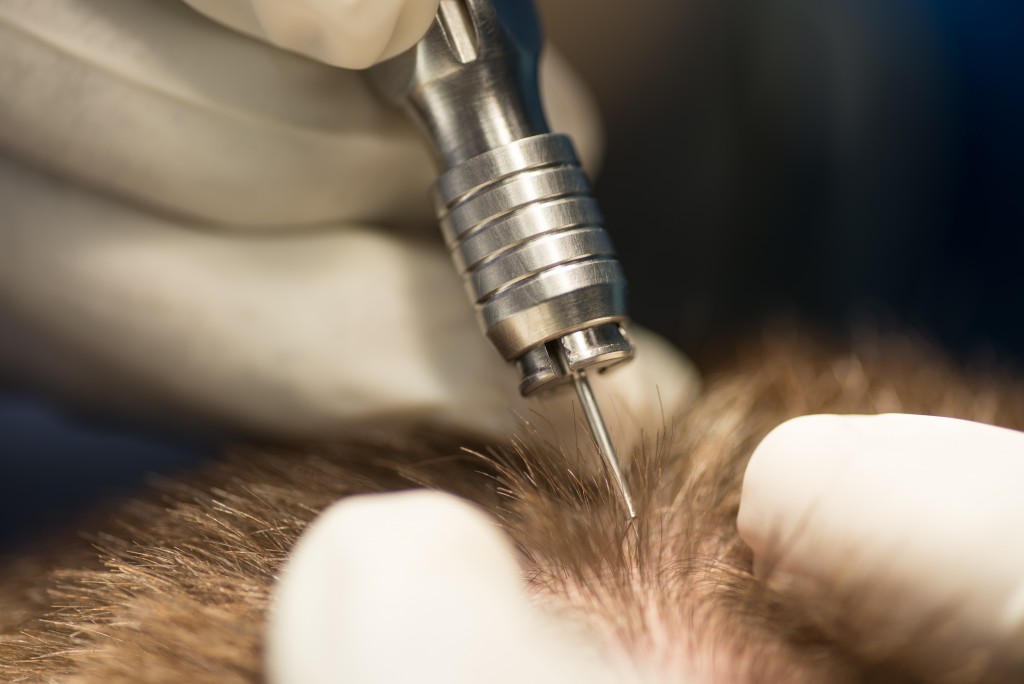
HAIR LOSS
Both men and women suffer from androgenic alopecia, or pattern baldness. Currently, the majority of 40 million American male sufferers and 21 million American female sufferers of hair loss have this genetic condition to thank. A strong family history of pattern baldness is a good indicator of whether or not it will cause your own hair to fall out. The condition passes to offspring through the parents’ X chromosomes, and makes scalp hair follicles extra sensitive to the hormone DHT. Although dihydrotestosterone is a common hormone, innately vulnerable hairs will become shrunken and destroyed by its presence amid the scalp.
In men, this manifests as hairline recession and crown thinning. In women, it becomes a diffuse loss across the top of the head. Other hair loss causes include traction alopecia, lupus, diabetes, thyroid dysfunction, pregnancy, malnourishment, and more.

HAIR RESTORATION: FOLLICULAR UNIT EXTRACTION INFO
FUE info provided by a quality resource will disclose both the positives and negatives of the technique. Beginning with the positives, FUE is ideal for achieving advanced aesthetic outcomes in all types of hair loss. Excellent for hairline refinement, temple point restoration, crown restoration, and the only base method for body hair transplant, it is an all-inclusive technique.

FUE uses an individual punch excision, size .8 to 1.2mm, to harvest each follicular unit. The grafts are preserved in a holding solution until the time of implantation. Customary blades are used to make microscopic slits in the recipient area, which enables each graft to be implanted with precise angulation, direction, and spacing. FUE allows for the excision of grafts from the nape or legs (where hair is finer) in order to enhance hairline design. It also facilitates the use of body hair for severely bald patients who would otherwise be considered inoperable.

Negative follicular unit extraction info would include the fact that the individual excision technique is a long and labor-intensive process for the surgeon. Thus, it requires a heightened level of medical skill and artistry to match the superior potential of the method. This means avoiding the use of commercialized robotic devices, having the best handheld tools, having boundless experience, and having the support of an expertly trained medical staff. With this, the surgeon will doubtless achieve an overall superior result. However, the drawback is that it all means higher overhead costs and longer hours in surgery, which equal a higher price for the patient. Though it is not a finite rule, FUE tends to be more expensive than FUT and other procedures.

PHOTOS AND VIDEOS
Photos and videos are a critical resource in the scope of follicular unit extraction info. Such visual documentation is the last word on whether or not an FUE surgeon is good—a picture is worth a thousand words. Quality images will be done in a well-lit space, in clear focus, and show the before-and-after from multiple angles. They will display the surgeon’s work, including the hairline design, temple point flow, crown whorl, spacing of grafts, and global density accomplished.
Always make sure the photos and videos have not been edited or retouched to appear better than they actually are. If a clinic cannot offer quality visual documentation of prior patient results, they are not worth your time.

FAQ
How much does FUE cost?
The cost can range from $5 per graft to $12 per graft depending on the clinic. Figure out the number of grafts you will need and multiply it by the per-graft cost to calculate your total price, roughly.
Where can I find more follicular unit extraction info?
The Internet is an excellent and usually free resource. For more info, visit blogs of prior patients, hair restoration discussion forums, clinic websites, and clinic consultations. Also, if you can, it is valuable to get in touch with a past patient and ask about his/her personal experience.
Are women candidates for FUE?
Yes, women can undergo FUE. Candidacy requires the patient to be over 24 years old, to have adequate donor supply, and to have no anesthesia allergies, no propensity for scarring, and no blood clotting abnormalities. Also, straight hair is ideal for excision, as curved follicles make the process more complicated.

